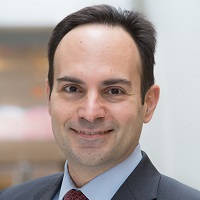I'm an Investment Professional: These Are the Three Money Tips I'm Giving My College Grad
College grads can help set themselves up for financial independence by focusing on emergency savings, opting into a 401(k) at work (if it's offered) and disciplined, long-term investing.


Profit and prosper with the best of Kiplinger's advice on investing, taxes, retirement, personal finance and much more. Delivered daily. Enter your email in the box and click Sign Me Up.
You are now subscribed
Your newsletter sign-up was successful
Want to add more newsletters?

Delivered daily
Kiplinger Today
Profit and prosper with the best of Kiplinger's advice on investing, taxes, retirement, personal finance and much more delivered daily. Smart money moves start here.

Sent five days a week
Kiplinger A Step Ahead
Get practical help to make better financial decisions in your everyday life, from spending to savings on top deals.

Delivered daily
Kiplinger Closing Bell
Get today's biggest financial and investing headlines delivered to your inbox every day the U.S. stock market is open.

Sent twice a week
Kiplinger Adviser Intel
Financial pros across the country share best practices and fresh tactics to preserve and grow your wealth.

Delivered weekly
Kiplinger Tax Tips
Trim your federal and state tax bills with practical tax-planning and tax-cutting strategies.

Sent twice a week
Kiplinger Retirement Tips
Your twice-a-week guide to planning and enjoying a financially secure and richly rewarding retirement

Sent bimonthly.
Kiplinger Adviser Angle
Insights for advisers, wealth managers and other financial professionals.

Sent twice a week
Kiplinger Investing Weekly
Your twice-a-week roundup of promising stocks, funds, companies and industries you should consider, ones you should avoid, and why.

Sent weekly for six weeks
Kiplinger Invest for Retirement
Your step-by-step six-part series on how to invest for retirement, from devising a successful strategy to exactly which investments to choose.
Every year, June is a month for "dads and grads," and this year was particularly poignant for me, as the dad of a high school graduate and a college graduate. Our middle daughter graduated college and just started her first, as she puts it, "big-girl job."
Instead of piecing together a handful of part-time jobs around her school schedule, it's her first full-time job with a full-time commitment.
She's excited about the prospect of a steadier paycheck, as it opens the potential for long-term financial success, but she's also a bit nervous about some more serious adulting.
From just $107.88 $24.99 for Kiplinger Personal Finance
Become a smarter, better informed investor. Subscribe from just $107.88 $24.99, plus get up to 4 Special Issues

Sign up for Kiplinger’s Free Newsletters
Profit and prosper with the best of expert advice on investing, taxes, retirement, personal finance and more - straight to your e-mail.
Profit and prosper with the best of expert advice - straight to your e-mail.
Perhaps you have a child, grandchild or someone you hold dear who is also just starting out. How can you help them transition to financial independence?
The Kiplinger Building Wealth program handpicks financial advisers and business owners from around the world to share retirement, estate planning and tax strategies to preserve and grow your wealth. These experts, who never pay for inclusion on the site, include professional wealth managers, fiduciary financial planners, CPAs and lawyers. Most of them have certifications including CFP®, ChFC®, IAR, AIF®, CDFA® and more, and their stellar records can be checked through the SEC or FINRA.
I'd encourage recent graduates to focus on three areas: Developing an emergency savings fund, taking advantage of their employer's 401(k) match if they offer one and making disciplined, long-term investments.
No. 1: Develop an emergency savings fund
First things first — start by establishing an emergency savings fund. According to research from Vanguard, having just $2,000 in savings can provide a critical buffer, reducing the likelihood of financial stress and enhancing overall well-being.
This is especially important for those who are new to the workforce, as the financial stress associated with not having emergency savings can spill over into the workplace and impact productivity.
Workers without emergency savings are four times more likely to be distracted at work due to financial stress.
Vanguard's new consumer survey also found that 71% of Americans plan to shift their savings approach this summer to prioritize emergency savings and flexibility, especially in light of current market uncertainty.
With this in mind, it's important to create an emergency savings fund containing at least $2,000 or half a month's expenses, whichever is greater, and to put this money in a high-yielding savings vehicle, like Vanguard's Cash Plus Account, to help you earn stronger returns on your savings.
My daughter's spending account was earning practically zero interest, so she set up a high-yielding savings vehicle, with the account features she desired, to help her earn stronger returns to bolster her savings.
And remember, you don't have to get to your savings goal all at once. Young investors can start small by automating a portion of their paycheck, even $10 or $20, to a high-yielding savings vehicle to help build a savings buffer.
No. 2: Take advantage of your employer's 401(k) match
Retirement may be one of the furthest things from the mind of a young investor — it's a classic "important but not urgent" goal. But if an employer offers matching contributions, it's important to take advantage of them.
Many plans offer matching contributions of 50 cents on the dollar — or even dollar for dollar — up to a certain percentage of pay.
- The match is free money. Any matching contributions from your employer, and their associated earnings, usually become yours over time in a process called vesting
- The money you contribute to the plan is yours — and yours alone — from day one
Find out if your employer offers a matching contribution and make sure you're saving enough to receive the full benefits.
Looking for expert tips to grow and preserve your wealth? Sign up for Building Wealth, our free, twice-weekly newsletter.
There are long-term impacts of missing out on employer matches that can compound over time and lead to a significant gap in retirement savings compared to a colleague who took advantage of this match.
And if your employer offers a Roth 401(k) option, younger investors may want to consider choosing a Roth 401(k) over a 401(k) if you believe your current tax bracket will be lower now than when you retire.
No. 3: Make disciplined, long-term investments
The lines between gambling and investing are blurred like never before — and many brokerages are enticing their customers to trade more frequently.
That's why it's important to develop a disciplined approach to long-term investing. Vanguard has always prided itself on its four principles for investing success:
- Create clear, appropriate investment goals
- Keep a balanced, diversified mix of investments
- Minimize cost
- Maintain perspective and long-term discipline
All investors — especially young ones — can leverage these principles in their investing journey. And it's important to remember that all investing is subject to risk, including the possible loss of the money you invest.
Starting a new job brings with it great opportunities and responsibilities. By developing healthy habits now, young investors can set themselves up for long-term financial wellness and independence from the "Bank of Mom and Dad."
Related Content
- A Little-Known Tax-Free Way To Help Pay Your Student Loan
- 529 to Roth IRA: Should You Rollover Unused 529 Funds?
- The Earlier You Take Advantage of Your 401(k), the Better
- Don't Veer Off Course at the First Sign of a Squall in the Markets
- A Frugal Saver's Guide to Spotting Investment Costs
Profit and prosper with the best of Kiplinger's advice on investing, taxes, retirement, personal finance and much more. Delivered daily. Enter your email in the box and click Sign Me Up.

James Martielli, CFA®, CAIA®, heads Investment Product, Personal Investor, which is responsible for designing and enhancing Vanguard's brokerage and investment product offer, amplifying distribution efforts and shaping the investment methodology that fuels unmatched investment and savings outcomes for our clients. Previously, James led Investment & Trading Services (ITS), which educates individual investors about Vanguard's products and provides trade execution for the securities and products on Vanguard's retail brokerage platform.
-
 Quiz: Do You Know How to Avoid the "Medigap Trap?"
Quiz: Do You Know How to Avoid the "Medigap Trap?"Quiz Test your basic knowledge of the "Medigap Trap" in our quick quiz.
-
 5 Top Tax-Efficient Mutual Funds for Smarter Investing
5 Top Tax-Efficient Mutual Funds for Smarter InvestingMutual funds are many things, but "tax-friendly" usually isn't one of them. These are the exceptions.
-
 AI Sparks Existential Crisis for Software Stocks
AI Sparks Existential Crisis for Software StocksThe Kiplinger Letter Fears that SaaS subscription software could be rendered obsolete by artificial intelligence make investors jittery.
-
 Quiz: Do You Know How to Avoid the 'Medigap Trap?'
Quiz: Do You Know How to Avoid the 'Medigap Trap?'Quiz Test your basic knowledge of the "Medigap Trap" in our quick quiz.
-
 5 Top Tax-Efficient Mutual Funds for Smarter Investing
5 Top Tax-Efficient Mutual Funds for Smarter InvestingMutual funds are many things, but "tax-friendly" usually isn't one of them. These are the exceptions.
-
 Why Invest In Mutual Funds When ETFs Exist?
Why Invest In Mutual Funds When ETFs Exist?Exchange-traded funds are cheaper, more tax-efficient and more flexible. But don't put mutual funds out to pasture quite yet.
-
 We Retired at 62 With $6.1 Million. My Wife Wants to Make Large Donations, but I Want to Travel and Buy a Lake House.
We Retired at 62 With $6.1 Million. My Wife Wants to Make Large Donations, but I Want to Travel and Buy a Lake House.We are 62 and finally retired after decades of hard work. I see the lakehouse as an investment in our happiness.
-
 Social Security Break-Even Math Is Helpful, But Don't Let It Dictate When You'll File
Social Security Break-Even Math Is Helpful, But Don't Let It Dictate When You'll FileYour Social Security break-even age tells you how long you'd need to live for delaying to pay off, but shouldn't be the sole basis for deciding when to claim.
-
 I'm an Opportunity Zone Pro: This Is How to Deliver Roth-Like Tax-Free Growth (Without Contribution Limits)
I'm an Opportunity Zone Pro: This Is How to Deliver Roth-Like Tax-Free Growth (Without Contribution Limits)Investors who combine Roth IRAs, the gold standard of tax-free savings, with qualified opportunity funds could enjoy decades of tax-free growth.
-
 One of the Most Powerful Wealth-Building Moves a Woman Can Make: A Midcareer Pivot
One of the Most Powerful Wealth-Building Moves a Woman Can Make: A Midcareer PivotIf it feels like you can't sustain what you're doing for the next 20 years, it's time for an honest look at what's draining you and what energizes you.
-
 Stocks Make More Big Up and Down Moves: Stock Market Today
Stocks Make More Big Up and Down Moves: Stock Market TodayThe impact of revolutionary technology has replaced world-changing trade policy as the major variable for markets, with mixed results for sectors and stocks.